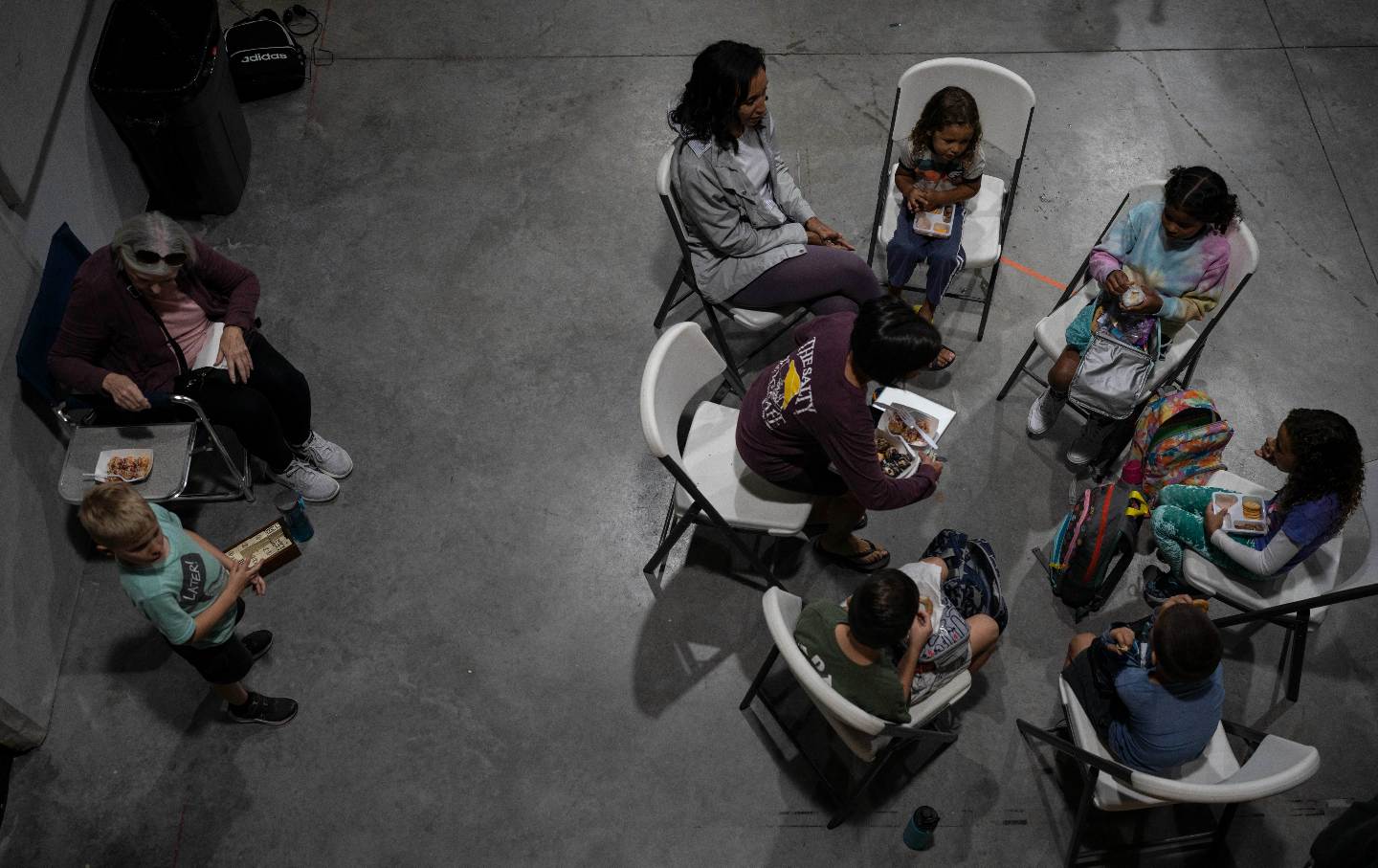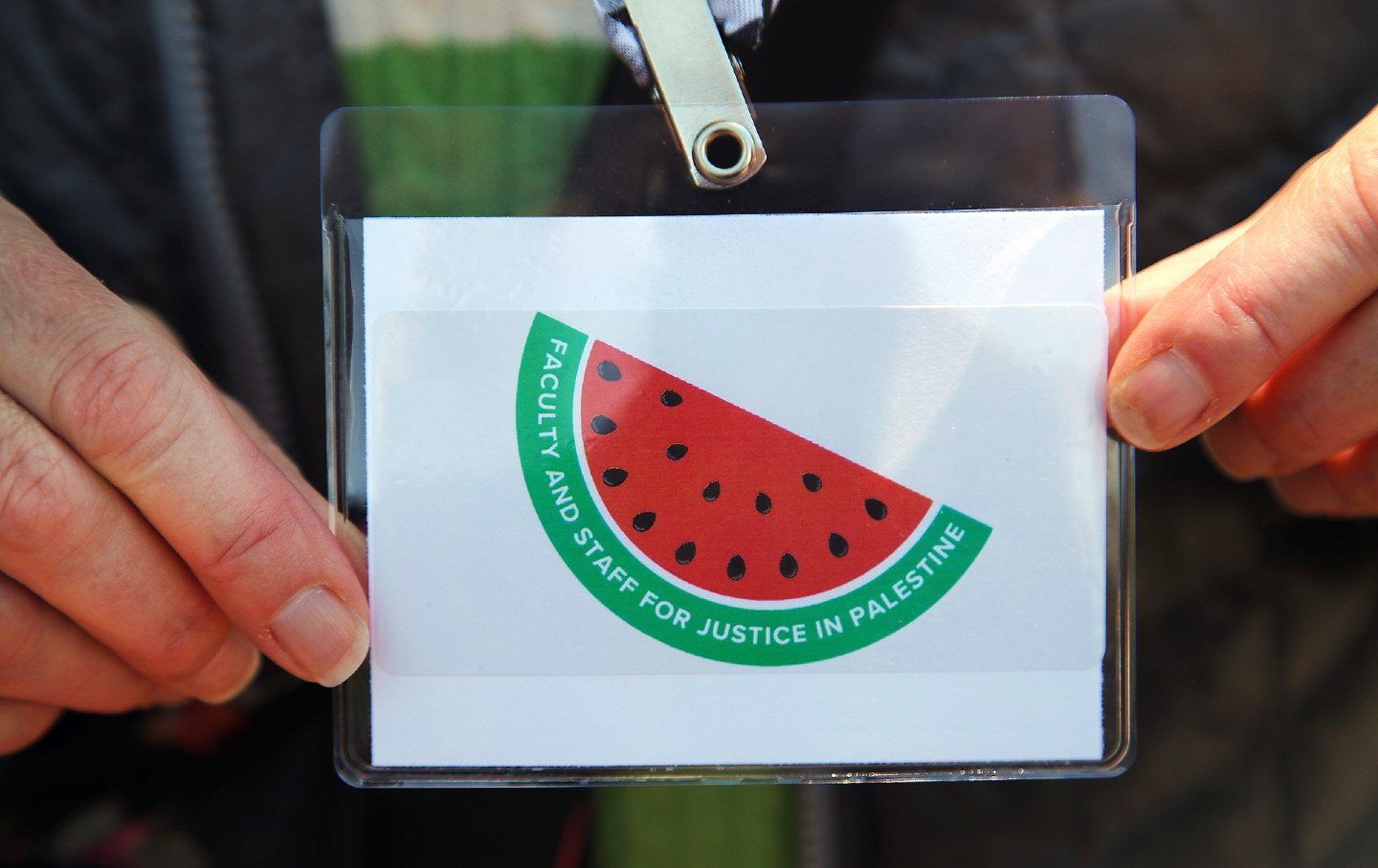Homeschooled Students’ Invisible Mental Health Crisis
Homeschooling has become America’s fastest-growing form of education, but many parents aren’t equipped to handle their children’s mental health struggles alone.

Parents and students at Trinity Homeschool Academy in Tampa, Fla.
(Thomas Simonetti / Getty)For this series, five young journalists responded to our calls for articles detailing critical issues that impacted young people this year. The group of high school and young college writers pitched and reported on urgent topics like lack of access to mental health support for homeschooled students, student voices being silenced in schools, book bans, attacks on LGBTQ+ students, and school shootings. Of course, these are just a fraction of the issues that shape the lives, conditions, and experiences of young people—not to mention how these issues intersect with each other. We received more important pitches than we could publish this round. As we close out the year, this package centers the work of young journalists reporting on what affected their schools, communities, and peers in 2023.
—Rainesford Stauffer
As the fourth anniversary of the Covid-19 pandemic approaches, its legacy continues to have a profound impact on young people and their mental health. It pushes the boundaries of our endurance, shapes legislation, and transforms our online interactions.
Students, who grappled with unique challenges long before the pandemic’s arrival, are often the most acutely affected. A report from the Center for Disease Control and Prevention indicates a rise in poor mental health among youth, particularly affecting female students, LGBTQ+ students, and those who have experienced racism. It noted that the severe understaffing of school mental health offices is just one barrier to student resource access.
However, even these inadequate school-based resources fail to reach a key group of young people facing an ongoing mental health crisis: homeschooled students.
As a direct consequence of Covid-19, homeschooling has become America’s fastest-growing form of education according to The Washington Post. According to this report, in thousands of school districts nationwide homeschooling saw a sharp increase at the start of the pandemic, which has continued through the 2022–23 academic year.
Despite the surge in numbers, home-based education in the United States remains largely unregulated. “In my experience, [dedicated mental health resources] are quite often inaccessible for me,” says Rana, a currently homeschooled student whose last name is being withheld to protect their privacy. “The pandemic definitely worsened my mental health,” they added, noting that they used to attend homeschooling group co-ops, but those stopped.
Eve Ettinger, an advocate for homeschooling regulation, highlights that the difficulty of documenting the mental health struggles of homeschooled students lies not only in relaxed legislation but also in the unique dynamic of homeschooled families. Potential regulation could involve implementing regular mental health assessments for homeschooled students to ensure their emotional well-being, providing a proactive approach to support the unique needs of these students. Additionally, offering accessible support networks and counseling services could contribute to fostering a positive environment that prioritizes academic and mental development.
“They are not being diagnosed or being provided resources because they are constantly with their family—they’re normal in this small unit,” Ettinger, a homeschool alumni, says. “I think one of the things you’ll see is a lot of homeschooled kids—if they were in public—they would be getting support. They may have compounded struggles, and parents aren’t equipped to meet their particular needs.”
Among the limited sources offering information on the mental health of homeschoolers is a 2016 survey published by Homeschool Alumni Reaching Out (HARO). The results of this nine-part survey detailed that around half of all respondents had experienced mental illness, with the majority of those participants suffering from depression and anxiety. Approximately 67 percent of caregivers thought that mental illness was a religious or superstitious matter, thus restricting and distorting the level of care provided. Researchers with HARO believe that these figures have increased since the survey’s publication, especially for teenagers, LGBTQ+ students (or other minority group students), and those who homeschool throughout their entire K-12 education.
Queer and transgender homeschoolers are one of the hardest-hit subgroups of homeschooled students without access to the same institutional and relational supports that are given to their public school counterparts. Startling statistics show that roughly 60 percent of LGBTQ+ youth seeking mental health care this past year could not access it. This trend is especially pertinent in homeschooling, where the lack of structured support systems may worsen the difficulties faced by marginalized students.
In a separate, 2019 study on LGBTQ+ homeschooled youth and their mental health, researchers found that, among the 651 participants, high rates of mental illness and suicidal ideation were reported. They noted that “a positive family attitude toward LGBTQ+ people and access to the Internet were the most significant protective factors against negative mental health outcomes.”
One such youth is Naomi, a 19-year-old, queer andnon-binary formerly homeschooled student based in New York. “Since I was closeted for most of my homeschool years, it significantly impacted my mental health—especially in middle school,” they expressed.
Popular
“swipe left below to view more authors”Swipe →Naomi was homeschooled through grades K-12 before graduating from high school earlier this year. They described their experiences as overwhelmingly negative. Luckily, they used resources from the Trevor Project—an American nonprofit that provides information and mental health support to LGBTQ+ youths—in middle school and had access to a licensed psychologist for several years. “It gave me a space to realize I wasn’t alone—that there were people just like me going through similar things.”
This complexity intensifies for homeschooled students who often find themselves in a precarious situation when trying to access mental health support. “[These] resources already exist, but parents can’t provide all of those, and kids can’t self-advocate because they can’t identify what they are going through,” says Ettinger. And the more isolated a child is, the more complicated it can get. “There are some [resources] that are easy to access, but when you have the infrastructure of a school system, you have other people around who can help you identify what you’re going through.”
While there are still questions as to what long-term mental health support would look like for homeschooled students, there is promising potential in the form of personalized outreach programs.
In a notable 2021 study conducted by Amanda Harper and Tracey Brewer, a select group of students from a local co-op actively participated in the Creating Opportunities for Personal Empowerment (COPE) program—an innovative, Cognitive Behavioral Therapy–based initiative designed to provide mental health support for adolescents grappling with depression and anxiety. The outcomes revealed that participants found the COPE program to be genuinely beneficial, expressing newfound insights into managing their thoughts, emotions, and behaviors.
Alongside these efforts, there are movements that are actively addressing issues of inaccessible mental health resources and isolation. The Coalition for Responsible Home Education, a national nonprofit, stands as an advocate for homeschooled students, striving to elevate their stories into mainstream media and provide resources. Meanwhile, Homeschool Recovery, a subreddit for those who have had negative experiences with homeschooling, has quickly grown its membership to over 23K.
For Naomi, dedicated mental health resources were their lifeline, but the needs of homeschooled students are far greater than what is currently provided for. “It’s super important to have reliable and trustworthy information available to people.”
We cannot back down
We now confront a second Trump presidency.
There’s not a moment to lose. We must harness our fears, our grief, and yes, our anger, to resist the dangerous policies Donald Trump will unleash on our country. We rededicate ourselves to our role as journalists and writers of principle and conscience.
Today, we also steel ourselves for the fight ahead. It will demand a fearless spirit, an informed mind, wise analysis, and humane resistance. We face the enactment of Project 2025, a far-right supreme court, political authoritarianism, increasing inequality and record homelessness, a looming climate crisis, and conflicts abroad. The Nation will expose and propose, nurture investigative reporting, and stand together as a community to keep hope and possibility alive. The Nation’s work will continue—as it has in good and not-so-good times—to develop alternative ideas and visions, to deepen our mission of truth-telling and deep reporting, and to further solidarity in a nation divided.
Armed with a remarkable 160 years of bold, independent journalism, our mandate today remains the same as when abolitionists first founded The Nation—to uphold the principles of democracy and freedom, serve as a beacon through the darkest days of resistance, and to envision and struggle for a brighter future.
The day is dark, the forces arrayed are tenacious, but as the late Nation editorial board member Toni Morrison wrote “No! This is precisely the time when artists go to work. There is no time for despair, no place for self-pity, no need for silence, no room for fear. We speak, we write, we do language. That is how civilizations heal.”
I urge you to stand with The Nation and donate today.
Onwards,
Katrina vanden Heuvel
Editorial Director and Publisher, The Nation
More from The Nation

Sundays With Noel Sundays With Noel
Noel Parmentel was, according to his former lover and mentee, Joan Didion, the ‘outsider who lived by his ability to manipulate the inside.’

Bosses Are Retaliating Against Workers for Showing Solidarity With Palestinians Bosses Are Retaliating Against Workers for Showing Solidarity With Palestinians
Workers are losing their jobs and professional opportunities for expressing pro-Palestinian sentiment. Others are choosing to self-censor amid a climate of fear.

When It Comes to Public Health, We Need to Tap Into People, Not Pundits When It Comes to Public Health, We Need to Tap Into People, Not Pundits
The future of our health under Trump is going to be bleak. But the solution lies in our communities, not individual personalities.

Mr. Scarborough Goes to Mar-a-Lago Mr. Scarborough Goes to Mar-a-Lago
The hosts of Joe Biden’s favorite political talk show have quickly pivoted to kissing the ring of the incoming president.

Watching a Parallel Media Try to Make Trump the Big Sports Story Watching a Parallel Media Try to Make Trump the Big Sports Story
The president-elect did not dominate the world of sports this weekend, but Fox News and Internet tabloids are inventing new realities.

The First Amendment Will Suffer Under Trump The First Amendment Will Suffer Under Trump
Given what’s heading our way, we need a capacious view and robust defense of the First Amendment from all quarters.


